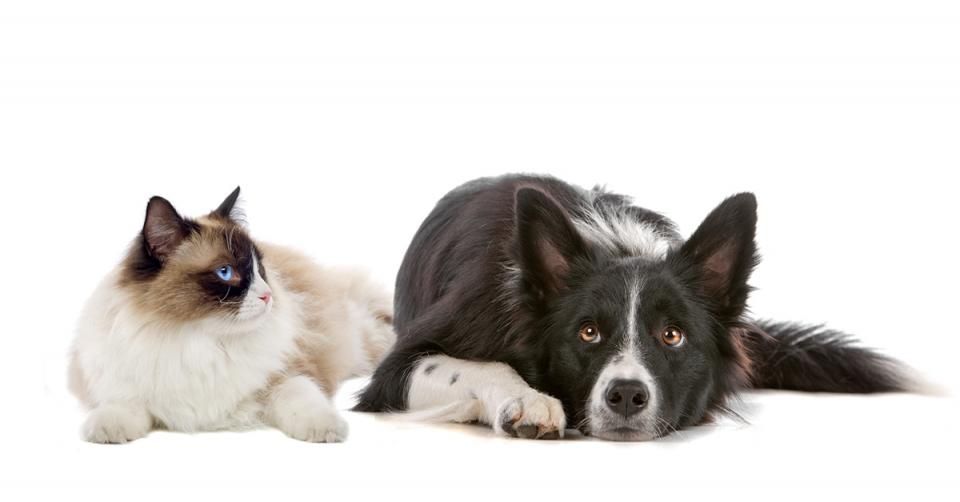Mr and Mrs Thomas, Kent, UK
Answer: Pancreatitis – inflammation of the pancreas – is a very painful, life-threatening and commonly under-diagnosed condition that affects both cats and dogs. The inflammation causes leakage of the digestive enzymes from the pancreas, and as a result, the pancreas literally starts digesting itself.
Pancreatitis can be acute (sudden) or chronic (developing slowly over a period of time). While both forms are life threatening, the acute form is more serious and painful.
In most cases the cause is unknown, and dogs seems to suffer more than cats. The acute form is more common in dogs, while cats tend to develop the chronic form, exhibiting milder symptoms.
In dogs, the trouble usually starts when they eat something too rich (like a whole birthday cake) or too foreign (a dead bird). These can be challenging for the dog’s digestive system; the pancreas is overburdened and becomes inflamed. Instead of sending the digestive enzymes to the duodenum (the first section of the small intestine), the pancreas starts to leach them into the abdomen and raises the enzyme levels in the blood, causing severe pain.
The chronic form in dogs may be caused by a high-fat diet, viral or bacterial infections, contaminated food and water, diabetes mellitus and also the use of certain drugs like organophosphate parasiticides, antibiotics and diuretics.
In cats, pancreatitis is most common in those with cholangiohepatitis (inflammation of the liver and bile ducts), fatty liver disease and inflammatory bowel disease.
Symptoms and diagnosis
Pancreatitis is extremely difficult to diagnose, especially in cats, as the symptoms are very vague and can range from gastrointestinal upset to sudden collapse and death.
In acute cases, the abdomen becomes painful and distended, vomiting and nausea follow, and the animal stops eating and becomes depressed and lethargic. A dog may adopt a ‘praying’ position, with its head close to the ground and its hindquarters in the air, while a cat may present with a lack of appetite and even jaundice.
Always see your vet if your pet displays any of these symptoms, as animals can die from pancreatitis. A vet will obtain a full history (dietary indiscretions like eating garbage, scavenging, cakes, fatty food, etc. must be mentioned) and then perform a thorough clinical examination.
By a process of elimination and differential diagnoses, he or she may arrive at a provisional diagnosis of acute/chronic pancreatitis. Following this, a diagnostic blood test called CPLI (canine pancreatic lipase immunoreactivity) in dogs and a FPLI (feline pancreatic lipase immunoreactivity) in cats may be needed, as well as an ultrasound of the abdomen and X-rays.
Conventional treatment
The treatment of pancreatitis is primarily supportive, meaning that there isn’t usually a direct cause and cure, but the animal needs to be cared for while allowing natural healing to occur or the pancreas to recover. The veterinary team will take care of the animal’s fluid needs with an intravenous (IV) drip, and will address any other conditions like infection or diabetes.
The usual treatments are:
Nothing by mouth (no food) used to be the rule of thumb in pancreatitis. By doing this, you essentially switch off the pancreatic enzymes to prevent autodigestion. Resting the pancreas and gastrointestinal system is key to recovery. This means no food or water by mouth for several days while on IV fluids. The length of time is dependent on the severity of each case, and the animal must be on fluids and other support to survive and heal the pancreas while off oral food and water. Nowadays, pets can be fed special low-fat food via a nasogastric tube (straight into the stomach), thereby bypassing the pancreas.
Pain relief. Antibiotics, antacids, anti-emetics and other medications may be prescribed, depending on the case.
A low-fat diet. After recovery, a low-fat prescription diet like Hill’s i/d or Royal Canin Low Fat Gastrointestinal diet is recommended. In cats, the treatment varies depending on whether the animal also has jaundice, cholangiohepatitis or other conditions.
Natural treatments
Viewed holistically, pancreatitis is not so much a distinct condition but rather a larger disease complex. Instead of pumping drugs into an animal on diagnosis, it is better to focus on this broader complex and ease it with holistic measures. Here are some of the best options.
Switch to natural, top-quality pet food. Several holistic vets believe that years and years of feeding commercial pet food lacking in natural digestive enzymes can overload a pet’s digestive system, and this additional stress can cause the pancreas to malfunction. They therefore recommend giving dogs and cats high-quality, all-natural foods (such as the pet food made by Castor & Pollux, Applaws, and Natural Planet) after recovery.
Homemade diets low in fat and oils, consisting of meat like chicken or turkey and grains like brown rice or millet, may serve the same purpose and work out to be healthier and cheaper.
During the initial illness, you can put your pets on a liquid fast and feed them small amounts of chicken or vegetable broth (see recipe, below) multiple times throughout the day. Also give them access to distilled water.
Consider homeopathy. Holistic vet Dr Martin Goldstein recommends injecting a pancreas homeopathic remedy followed by a program of ‘pancreatic drops’ and Pancreatrophin (Standard Process Labs), which is a glandular extract. Homeopathic vet Francis Hunter advises using Arsenicum Album, Mercuris Solubilis, Versicolor and Haronga for treating the symptoms. For an individualized treatment, consult a homeopathic vet near you for advice.
Try vitamins and minerals. Antioxidants like vitamins C and E may reduce the severity and frequency of pancreatitis attacks. Vetri-Science makes a product called Cell Advance for dogs and cats that’s packed with antioxidants as well as
various immune-supporting nutrients.
Pets suffering from pancreatitis may also have low blood calcium, so it’s also worth giving calcium supplements.
Go for digestive enzymes. Supplemental digestive enzymes such as Florazyme LP powder may help the pancreas ‘rest’ during flare-ups.
Try live-culture yogurt. This is full of beneficial bacteria, which may be helpful. Try giving cats 1 teaspoon of yogurt 3-5 days a week and dogs 1 tablespoon, depending on size.
Avoid unnecessary chemicals. Try to use natural flea control and worming products whenever possible, as repeated exposure to chemical parasiticides and herbicides can damage the pancreas.
Consider hands-on healing, which could help to ease your pets’ distress and help them to recover more quickly. Focus especially on the solar plexus, which is said to rule the pancreas. See my book You Can Heal Your Pet for how to administer hands-on healing to your pet.
Simple chicken broth
This simple recipe is suitable for both dogs and cats, and ideal to help them recover from pancreatitis:
1) Place a cooked chicken carcass in a large lidded saucepan and add 2½ cups of water.
2) Bring to a boil, then turn off the heat and leave to cool, preferably overnight, with the lid on.
3) Remove the carcass and strain the liquid into a glass container with a lid. Keep refrigerated and use within three days.
Optional extras: Carrots, green beans, zucchini, potatoes, broccoli (florets
and stalks)
Adapted from You Can Heal Your Pet by Rohini Sathish and Elizabeth Whiter (Hay House, 2015)
Rohini Sathish, DVM, MSC, MRCVS, MHAO, MCIVT
Dr Sathish is an award-winning holistic vet with 22 years of experience. After training in acupuncture, acupressure, energy healing, Emotional Freedom Technique (EFT), animal communication and herbal medicine, she now actively integrates conventional veterinary treatments with complementary therapies and is co-author of You Can Heal Your Pet (Hay House, 2015). You can contact Dr Sathish at her website: www.rohinisholisticvetcare.com




